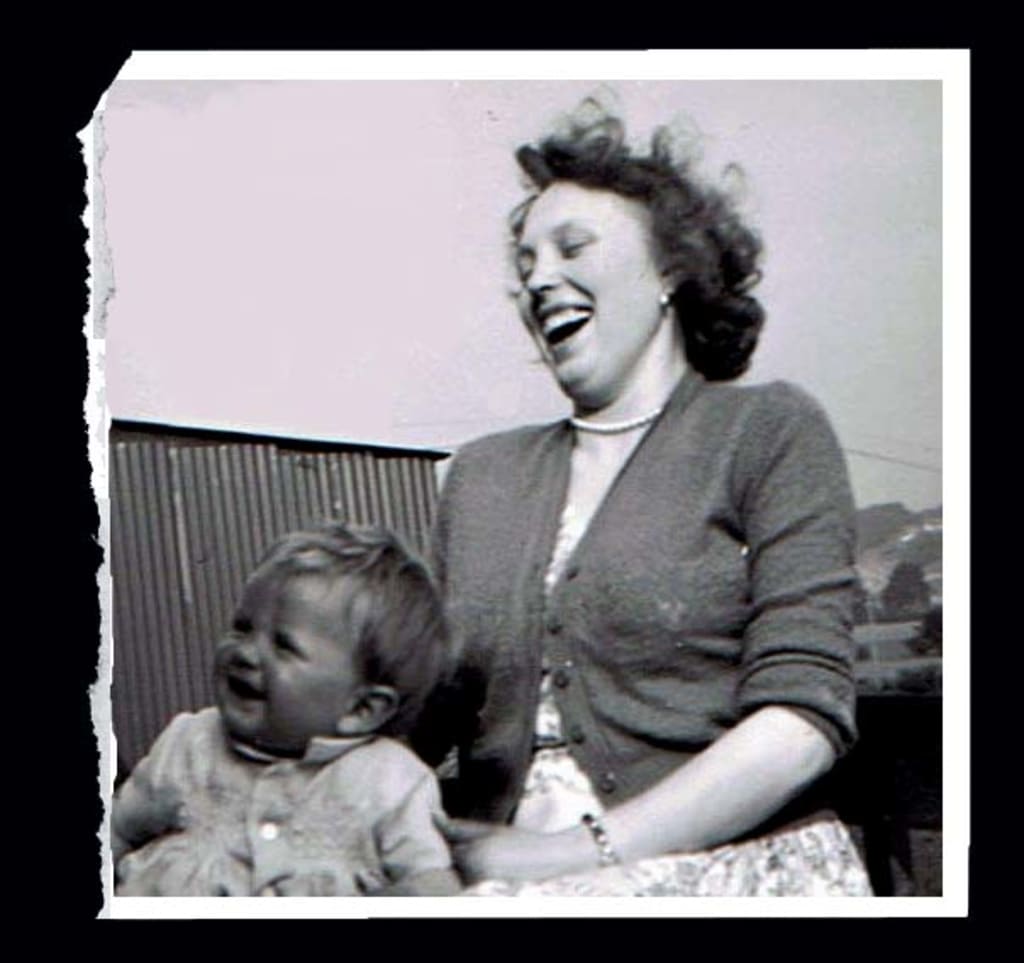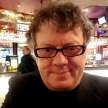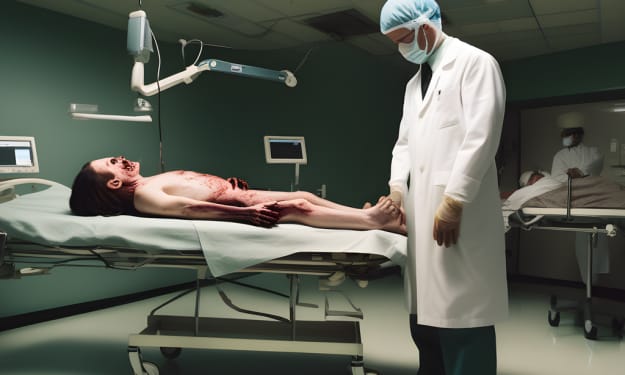
The house had died with Mother. It had been two weeks since her emaciated body gave up the fight at Saint Luke’s Hospital in town, and when she stopped breathing, the heart of the house was also stilled.
I let myself into the frigid hallway. Tightly shut windows kept in the chilled air, on which hung the faint smell of cold cooking fat. In the now inappropriately named living room, dead flowers hung limp over the rim of a vase on the windowsill, and a brace of dead flies lay on their backs on the white paintwork. What had once been a living, breathing home was now a cold, dead house.
A skeleton in fact, because most of the furniture had been removed and divided up between Mother’s close friends and a local charity that provides household goods for those in need. As an only child earning good money as a commercial photographer, and the owner of a spacious house that was new when I took possession of it, I had no use for the old-fashioned furniture that Mother loved so much. “There’s no substitute for good, honest craftsmanship,” she used to say whenever I suggested she modernise. She stuck firmly to this belief too; the layout of the house had barely changed since we moved in when I was a small boy. And now it was almost all gone.
Wilson was bringing the van over after lunch to take what was left of the house contents up to the local recycling depot. I busied myself rolling up the carpets, which were all past their best, and laying them on the frost-covered lawn ready to load onto the van.
I felt a great sense of melancholy as I stood alone in Mother’s bedroom, now completely bare apart from the carpet, a lampshade, and a framed picture on the wall. A solitary get well card, which a neighbour had sent when Mother first became ill back in September, stood on the windowsill. The room had been dominated by the huge pine framed bed that she shared with Dad, but in which she had slept alone these past five years, since Dad died of a sudden heart attack. My thoughts began to drift towards reminiscing about the three of us on holiday in Scarborough, but I reminded myself that the past was gone and I was here to do a job. I pulled up one end of the carpet and began rolling it up tightly, shuffling forward on my knees as I went. After I’d progressed about six feet, I felt a sudden pain as I knelt on something solid on the floor. I looked down and saw that it was an old key of dull gunmetal grey. I shrugged and tossed it onto the windowsill by the get well card, assuming it must have come from a wardrobe.
As I continued to roll up the carpet, I couldn’t rid myself of the thought that the key was too long for a wardrobe, and I mulled over possible locks it might fit. Then it hit me.
“The rusty door!” I said aloud, and I sprang to my feet and snatched the key from the windowsill.
The rusty door, as we called it, was about eight inches square, and it was built into a wall in the basement. I remember that as a child, I asked Mother what was behind it. She told me that she had never been given a key for it, and there was probably nothing inside anyway. Now, all these years later, here was a key that might fit. I hoped it didn’t.
I ran downstairs and into the basement where, by the light of a bare bulb, I inserted the key into the lock of the door. It was a perfect fit. With my heart pounding from exertion and expectation, I turned the key. The lock offered considerable resistance, and the key got stuck half way so I used a large screwdriver as a lever. With some effort, I managed to complete the turn and the mechanism voiced its displeasure by letting out a loud creak. I placed one hand flat against the wall and with the other I grabbed the key and pulled the door open.
The small recess went back about a foot. Mother had been wrong about it being empty, because there was a wooden cigar box inside. I watched my fingertips tremble as I picked it out, and I noticed immediately that there was too much weight for it to contain cigars. I shook it, and whatever was inside rattled like what I guessed to be cards or photographs. Mother had always been a good, well-respected woman; a regular churchgoer and not one to have any skeletons in the cupboard, so I was puzzled and not a little unnerved. After all, the key had been hidden in her bedroom.
Wondering what on earth I had stumbled upon, I dashed back up the stairs into the less oppressive natural light of the kitchen. I placed the cigar box on the worktop and undid the small metal clasp that kept it closed and, with a throat as dry as ash, I lifted the lid. I was right about it containing photographs, and there were also a few folded documents inside.
The first photograph I studied was a monochrome shot of a dark-haired young man I didn’t recognise. He was standing in a garden, wearing a white shirt with the sleeves rolled up. I made the assumption that the photographs must have belonged to a previous owner of the house, but on seeing the second image, was immediately convulsed with violent butterflies to my stomach. It showed my mother, young and pretty, sitting on a garden bench with the stranger. This man appeared on several of the photographs, usually with my mother but, more disturbingly, sometimes with Mother and a baby. “My God, what is this?” I whispered. “Who is this man?”
The mystery deepened considerably when I unfolded one of the documents from the box and read the words Certificate of Marriage. Mother’s maiden name appeared on it below that of the groom, one Alfred Henry Spicer, but my parents’ surname is Trent. I noticed that the marriage had taken place in Lincoln, a very long way from where I now stood. In a state of bewilderment, I delved further into the box, where I found something even more disturbing; my own birth certificate. When I had asked to see my birth certificate one day, Mother told me that it had been in an envelope full of documents that was accidentally thrown out when I was a small boy. Clearly, she had lied to me again. Then came the next revelation, which was the name Alfred Henry Spicer in the column headed Father, and the birth was registered in Lincoln. I felt nauseous as my mind struggled to comprehend all of this, and I stared blankly at images of this intruder until I was snapped out of my trance by the honking of a horn that announced the arrival of Wilson.
We got the carpets to the recycling depot, although my distraction was such that Wilson kept asking if I was all right. I lied that I was.
“Here you are, sweetheart, I’ve brought you coffee,” Jane said in a soft voice. I had shown her the contents of the cigar box and I told her I was going online to see if I could find out anything about this person who clearly was my real father, and that a trip to Lincoln may be on the cards if my search proved fruitless. I swung round in the chair to face her.
“You know what?” I said, “When I was in my teens, I came across two photos in an envelope. They showed me as an infant with Mother, but they had been torn, as I thought, to remove a third party. I asked Mother about it, and she said that Dad had ripped up the photos during a row. I found it odd that the parts with the third party on were both missing, but I didn’t question it. And I once asked her why there were no photos of me as a child with Dad, but only a few of me with her. She told me it was because Dad was holding the camera. But now the truth; my dad wasn’t even my father. She lied to me. Lie after lie.” I blew my nose on a tissue.
“What have you found out?” Jane said in little more than a whisper, as though dreading the answer. No words would come, so I gestured towards the screen. On it there was an image of a newspaper front page that showed a photo of the man in the cigar box next to the headline Jackdaw Killer Guilty: Sentenced to Die. Jane put her hand to her mouth. “Oh my God, Frank,” she said.
This was the sordid truth. My father was a serial killer who murdered three innocent women in cold blood, and badly injured a fourth. The one who survived told police that her assailant wore a black mask that covered the upper part of his face, and after this the press dubbed him the Jackdaw Killer. A fingerprint on a car window gave him away and he was executed on June 17th, 1963, when I was three-years-old.
“How could she keep this from me all these years?” I said, with some agitation. Jane stood behind me and gently massaged my shoulders.
“I suppose she had to protect you,” she said. “You were a child; you couldn’t go to school with people knowing about this. You know what kids are like, they’d give you a nickname, Jackdaw Junior or something. They’re utterly heartless.” Although she was still shocked herself, Jane’s words were as soothing to my injured emotions as her fingertips were to my shoulders.
Later, in bed, I reflected on what Jane had said. I envisaged the torment I would have suffered right through school; the stigma I would have had to bear and the constant whispering and finger-pointing behind my back. Could I have pursued my successful career with all of that negativity going on in my life? I’d say probably not. In fact, the more I thought about it the clearer it became that Mother had done the right thing in moving away and giving me a new life, and I learned to accept that I was the son of a killer.
When they told me at the hospital that Mother was close to death, I stayed with her, holding her hand and reminiscing. I didn’t get much in return as she slipped in and out of consciousness, but I like to think that she could hear me. I thanked her for being who she was and for bringing me up in such a stable, loving environment. But since I made this grim discovery, I will be eternally thankful for the efforts she made to keep this dreadful secret from me and others so that I could enjoy a normal childhood.
By early summer I had pretty much come to terms with being the son of the Jackdaw Killer, although Jane and I kept that information between ourselves. Feeling a need to delve deeper into my father’s case, I had visited the local library, where I read a detailed account of the trial in a true crime anthology. This provided answers to a lot of questions I would naturally ask of my father, but it also shone some light onto me, and the person I am.
I arrived home from the library to find Jane in the back garden. It was the first really nice evening of the summer, and so she had decided that we would have dinner al fresco. After washing my hands, I passed behind Jane, who was tossing salad at the outdoor table. I slid my arm around her waist and held her close. We shared a hug and then I sat down with a glass of chilled white wine.
The evening sun warmed my face, and the first of the alcohol had taken effect, giving me a wonderful glow of contentment. The flowers along the border were in bloom, and the woman I loved sang softly by my side as she laid the table for our evening meal. Life felt good, despite my recent shock discovery.
Deep in thought, I stared at the bottom of the garden, focusing on a rose bed by the shed. Here, under the soil, lay the body of a young woman I had buried eighteen years ago.
I could never comprehend what had driven me to squeeze the life out of that innocent, nineteen-year-old model when I was alone with her in the house, but now I had a better understanding of it. I am Jackdaw Junior, and murder runs in the family.
About the Creator
Joe Young
Blogger and freelance writer from the north-east coast of England






Comments
There are no comments for this story
Be the first to respond and start the conversation.